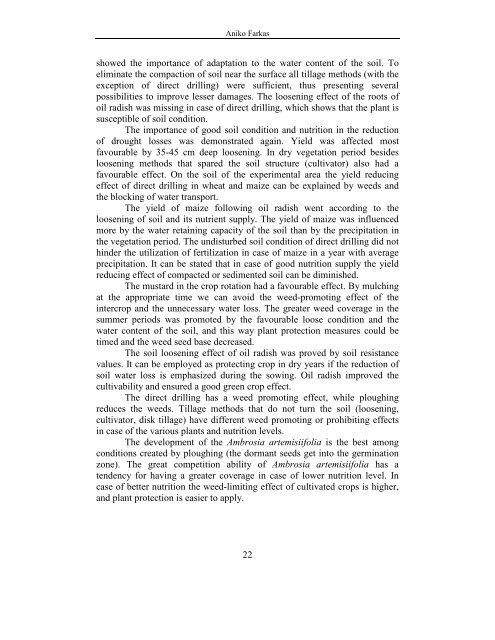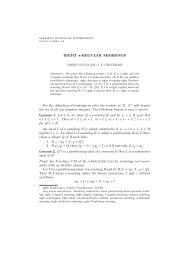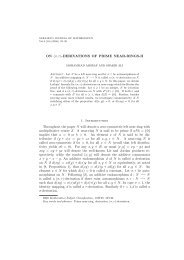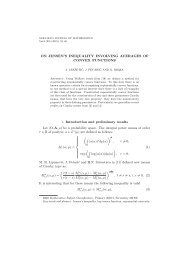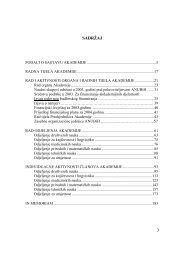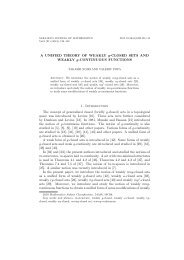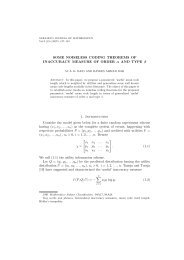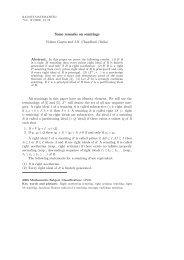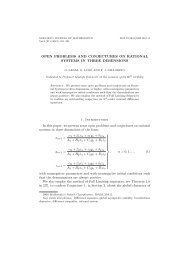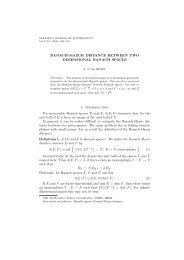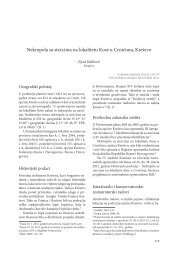HERBOLOGIA - anubih
HERBOLOGIA - anubih
HERBOLOGIA - anubih
Create successful ePaper yourself
Turn your PDF publications into a flip-book with our unique Google optimized e-Paper software.
Aniko Farkas<br />
showed the importance of adaptation to the water content of the soil. To<br />
eliminate the compaction of soil near the surface all tillage methods (with the<br />
exception of direct drilling) were sufficient, thus presenting several<br />
possibilities to improve lesser damages. The loosening effect of the roots of<br />
oil radish was missing in case of direct drilling, which shows that the plant is<br />
susceptible of soil condition.<br />
The importance of good soil condition and nutrition in the reduction<br />
of drought losses was demonstrated again. Yield was affected most<br />
favourable by 35-45 cm deep loosening. In dry vegetation period besides<br />
loosening methods that spared the soil structure (cultivator) also had a<br />
favourable effect. On the soil of the experimental area the yield reducing<br />
effect of direct drilling in wheat and maize can be explained by weeds and<br />
the blocking of water transport.<br />
The yield of maize following oil radish went according to the<br />
loosening of soil and its nutrient supply. The yield of maize was influenced<br />
more by the water retaining capacity of the soil than by the precipitation in<br />
the vegetation period. The undisturbed soil condition of direct drilling did not<br />
hinder the utilization of fertilization in case of maize in a year with average<br />
precipitation. It can be stated that in case of good nutrition supply the yield<br />
reducing effect of compacted or sedimented soil can be diminished.<br />
The mustard in the crop rotation had a favourable effect. By mulching<br />
at the appropriate time we can avoid the weed-promoting effect of the<br />
intercrop and the unnecessary water loss. The greater weed coverage in the<br />
summer periods was promoted by the favourable loose condition and the<br />
water content of the soil, and this way plant protection measures could be<br />
timed and the weed seed base decreased.<br />
The soil loosening effect of oil radish was proved by soil resistance<br />
values. It can be employed as protecting crop in dry years if the reduction of<br />
soil water loss is emphasized during the sowing. Oil radish improved the<br />
cultivability and ensured a good green crop effect.<br />
The direct drilling has a weed promoting effect, while ploughing<br />
reduces the weeds. Tillage methods that do not turn the soil (loosening,<br />
cultivator, disk tillage) have different weed promoting or prohibiting effects<br />
in case of the various plants and nutrition levels.<br />
The development of the Ambrosia artemisiifolia is the best among<br />
conditions created by ploughing (the dormant seeds get into the germination<br />
zone). The great competition ability of Ambrosia artemisiifolia has a<br />
tendency for having a greater coverage in case of lower nutrition level. In<br />
case of better nutrition the weed-limiting effect of cultivated crops is higher,<br />
and plant protection is easier to apply.<br />
22


